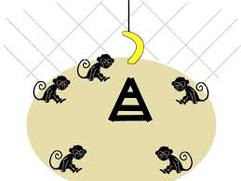| A family member asked me about a good psychology experiment that involved learning that she could write about. I showed her this one. It's one of my favorite experiments in the psych world and I think it is something to reflect on for its ties to corporate America and religious practices. I pulled the work below from At The Intersection Blog. Cited resources below. |
5 monkeys are locked in a cage, a banana was hung from the ceiling and a ladder was placed right underneath it.
As predicted, immediately, one of the monkeys would race towards the ladder, to grab the banana. However, as soon as he would start to climb, the researcher would spray the monkey with ice-cold water.
but here’s the kicker- In addition, he would also spray the other four monkeys…
When a second monkey tried to climb the ladder, the researcher would, again, spray the monkey with ice-cold water, As well as the other four watching monkeys;
This was repeated again and again until they learned their lesson
Climbing equals scary cold water for EVERYONE so No One Climbs the ladder.
The Experiment- Part 2
Once the 5 monkeys knew the drill, the researcher replaced one of the monkeys with a new inexperienced one. As predicted, the new monkey spots the banana, and goes for the ladder. BUT, the other four monkeys, knowing the drill, jumped on the new monkey and beat him up. The beat up new guy thus Learns- NO going for the ladder and No Banana Period- without even knowing why! and also without ever being sprayed with water!
These actions get repeated with 3 more times, with a new monkey each time and ASTONISHINGLY each new monkey- who had never received the cold-water Spray himself (and didn’t even know anything about it), would Join the beating up of the New guy.
This is a classic example of Mob Mentality- bystanders and outsiders uninvolved with the fight- join in ‘just because’.
When the researcher replaced a third monkey, the same thing happened; likewise for the fourth until, eventually, all the monkeys had been replaced and none of the original ones are left in the cage (that had been sprayed by water).
The Experiment- Part 3
Again, a new monkey was introduced into the cage. It ran toward the ladder only to get beaten up by the others. The monkey turns with a curious face asking “why do you beat me up when I try to get the banana?”
The other four monkeys stopped and looked at each other puzzled (None of them had been sprayed and so they really had no clue why the new guy can’t get the banana) but it didn’t matter, it was too late, the rules had been set. And So, although they didn’t know WHY, they beat up the monkey just because ” that’s the way we do things around here”…
Well, it seems to be true; not in the exact shape that it took here, but close enough,
Below is a quotation from the experiment, in scientific Jargon: (sources cited below)
“Stephenson (1967) trained adult male and female rhesus monkeys to avoid manipulating an object and then placed individual naïve animals in a cage with a trained individual of the same age and sex and the object in question. In one case, a trained male actually pulled his naïve partner away from the previously punished manipulandum during their period of interaction, whereas the other two trained males exhibited what were described as “threat facial expressions while in a fear posture” when a naïve animal approached the manipulandum. When placed alone in the cage with the novel object, naïve males that had been paired with trained males showed greatly reduced manipulation of the training object in comparison with controls. Unfortunately, training and testing were not carried out using a discrimination procedure so the nature of the transmitted information cannot be determined, but the data are of considerable interest.”
Sources:
Stephenson, G. R. (1967). Cultural acquisition of a specific learned response among rhesus monkeys. In: Starek, D., Schneider, R., and Kuhn, H. J. (eds.), Progress in Primatology, Stuttgart: Fischer, pp. 279-288.
Mentioned in: Galef, B. G., Jr. (1976). Social Transmission of Acquired Behavior: A Discussion of Tradition and Social Learning in Vertebrates. In: Rosenblatt, J.S., Hinde, R.A., Shaw, E. and Beer, C. (eds.), Advances in the study of behavior, Vol. 6, New York: Academic Press, pp. 87-88:”


